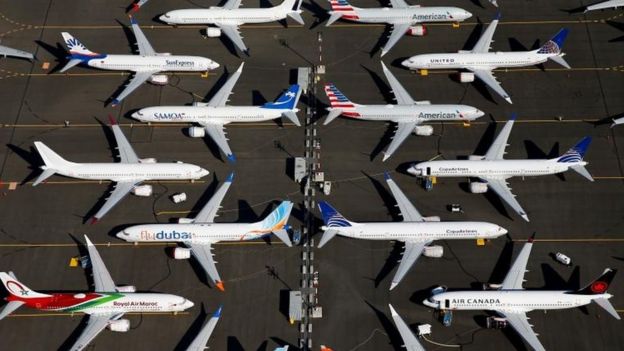
Ryanair has said it will be forced to cut the number of summer flights it operates next year blaming further expected delays before the Boeing 737 Max is allowed to fly again.
The airline said it could be as late as December before regulators clear the aircraft to return to the skies after two fatal crashes.
It was awaiting delivery of 58 planes before next summer but it now expects to receive just over half of those.
It could also close bases as a result.
The airline said it was in talks with airports about which of its hubs could suffer cuts.
"We are starting a series of discussions with our airports to determine which of Ryanair's underperforming or loss making bases should suffer these short term cuts and/or closures from November 2019," the airline's chief executive, Michael O'Leary, said in a statement.
Ryanair added that it would talk to its staff and unions about the planned closures, which it said were "directly caused" by the delays delivering the 737 Max.
The airline is now expecting to carry 157 million passengers in the year to March 2021, five million fewer than it had been planning for.
Airline analyst Chris Tarry told the BBC that the move to cut routes was "entirely predictable" after the 737 Max was grounded.
He said the plane was "unlikely, even with a following wind, to return to the skies before the end of the year".
There's a finite number of aircraft that Ryanair can use, he said, explaining that the airline would use those planes on the most profitable routes.
Another airline expert, John Strickland, said the grounding was likely to have an effect on the airline's growth plans. At present Ryanair has around 455 planes but it plans to expand its fleet to roughly 600 by 2025.
"A lot of it is about limiting growth rather than cutting back," he said.
"In the summer they would have expected to grow strongly, having additional bases and additional routes."
By Theo Leggett , BBC international business correspondent

It's looking increasingly unlikely that the 737 Max will be flying again before late autumn - and quite possibly not before next year. So should we be surprised?
In a word, no. The stakes are too high, and this is one decision the regulators simply can't afford to get wrong.
The Federal Aviation Administration has already faced heavy criticism for allowing the aircraft into service in its original form, with flight control software that has been implicated in two separate accidents and the loss of 346 lives.
A repeat would be simply unthinkable - and for the sake of its own reputation the FAA not only needs to be thorough but to be seen to be thorough.
So its analysis appears to have gone well beyond the fresh software developed to solve the original problem - and is now addressing a range of other potential issues.
Boeing does desperately want to get the 737 Max flying again and resume deliveries to customers - it's running out of parking space at its Renton factory for a start. Airlines also need the new plane.
But the message from the FAA has been consistent: it will lift the ban on flying "when we deem it is safe to do so".
No Max planes have flown since March after issues with its software were linked to crashes in Indonesia and Ethiopia, which killed 346 people.
Ryanair has a total of 135 of the controversial Boeing models on order, the first five of which are due for delivery this autumn.
It has become the latest airline to cancel flights as a result of the aircraft's grounding.
On Sunday, American Airlines said it was extending for a fourth time cancellations of about 115 daily flights. The cancellations will now continue into early November due to the continued grounding of the 737 Max.
However, the firm added: "American Airlines remains confident that impending software updates to the Boeing 737 Max, along with the new training elements Boeing is developing in coordination with our union partners, will lead to recertification of the aircraft this year."
But airlines are still putting in orders for the aircraft. At the Paris airshow last month, International Airlines Group, which owns British Airways, announced plans to buy 200 Max planes at a discount, referring to them as "B737 aircraft".
Boeing has yet to convince regulators that updates to its software are enough to ensure the Max's safety.
And last month the US Federal Aviation Administration, which must reapprove the jets for flight, uncovered a new flaw that Boeing estimates will take until at least September to fix.